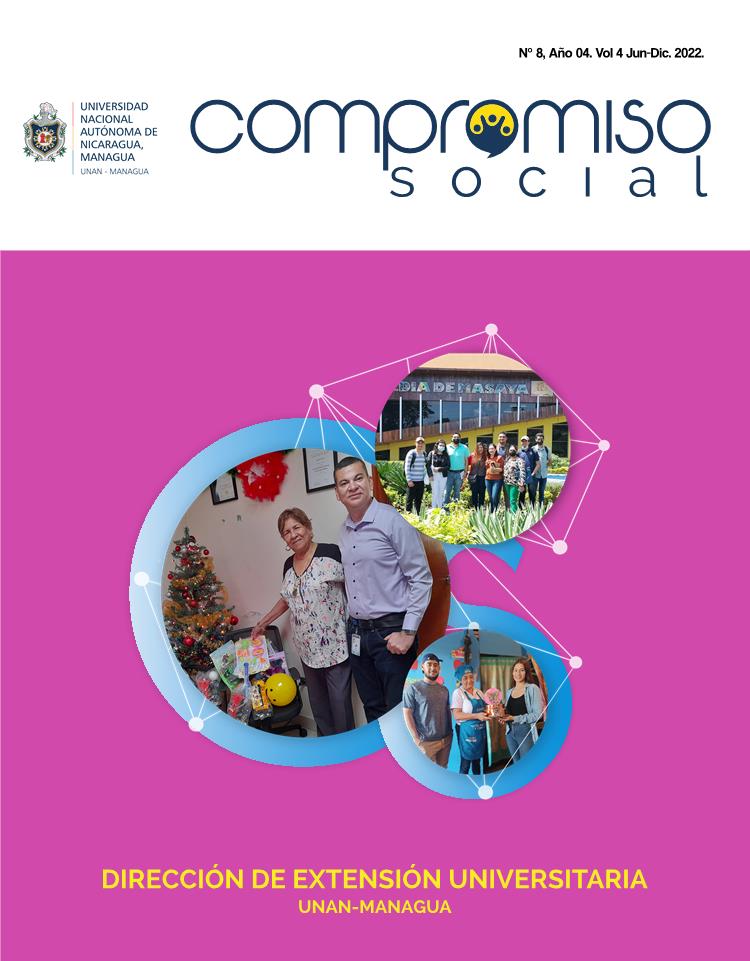Good Practices of Extension and social bonding: Theoretical confluences between Extension, service-learning and social responsibility
DOI:
https://doi.org/10.5377/recoso.v4i8.18613Keywords:
Service learning, Extension and linkageAbstract
Good practices of Extension and social linkage: Theoretical confluence between extension, learning - service and social responsibility, is related to university extension and its articulation with the institutional, state and company social sectors and has as objectives: to assess the theoretical confluences between social extension and the achievement of useful learning for society, as part of the social responsibility of the university and visualize how good practices of extension and social linkage converge with the social responsibility of the university in the dissemination and conservation of culture.
The mission of universities is to prepare the citizens of a country to meet the demands that society needs through the conservation, development and promotion of culture, science and social progress. In this sense, the extension work, service-learning and university social responsibility constitute processes that have points of contact and are distinguished from each other based on the fulfillment of said mission, encompassing various scenarios and approaches when expressing the links of the university with society and the state.
This paper addresses, fundamentally, from pedagogical theories, some theoretical reflections on University Extension processes, followed by a tour of servicelearning and university social responsibility, through the exemplification of extensionist practices of the Faculty Multidisciplinary Regional of Chontales of the UNAN Managua.
The university extension and social link, carried out from the FAREM Chontales, contributes to the development of the country, through actions that pay for responses to the SDGs, PNDH, Agenda 2030 and strategic lines of action of the UNAN-Managua. The methodology of the work is close to socio-cultural animation since all the experiences developed in recent years are based on social intervention that tries to modify the realities of groups of people, through extensionist practices and actions. In this sense, it is important to highlight that, through sociocultural animation processes, specific actions are developed as elements of extension and linkage, roughly, to visualize in the communities, the actions that modify their environment, for example, changes of behavior, regarding family and social coexistence, awareness of the need to care for the environment and overcoming risk behaviors.
Downloads
References
Beltrán, J., Bajo, I., Mata, E., & Segreda, A. (2014). La responsabilidad social universitaria, el reto de su construcción permanente. Revista Iberoamericana de Educación Superior, 3-18.
Correa, M., & Tur, R. (2022). La extensión universitaria, una contribución al desarrollo local sostenible en Remedios, Cuba. REVISTA UNIVERSITARIA DEL CARIBE, 7-12.
Gonzalez Peña, M. V., Ecalante Plá, L., & Soares, L. (27 de mayo de 2021). Confluencia tepricas entre extension, aprendizaje-servicio y responsabilida social. Buenas prácticas Universitarias. +Q2 Masquedós, 6(6). Recuperado el 20 de 06 de 2022, de https://ojs.extension.unicen.edu.ar/index.php/masquedos/article/view/123
Grupo Envera . (8 de agosto de 2019). Envera. Obtenido de https://grupoenvera.org/sin-categoria/agenda-2030-asi-contribuye-envera-once-los-objetivos-desarrollo-sostenible/#anchor
Martínez, D. (2019). El trabajo sociocultural comunitario: misión de la educación superior. Revista Iberoamericana de Educación Superior, 187-206.
MINED. (2022). MINED. Obtenido de https://www.mined.gob.ni/programa-integral-de-nutricion-escolar/#:~:text=Contribuci%C3%B3n%20de%20la%20merienda%20escolar&text=Garantiza%20las%20energ%C3%ADa%2C%20para%20que,del%20Patr%C3%B3n%20Alimentario%2C%20Cultura%20alimentaria.
Paz, M. S. (12 de octubre de 2019). UNAN FAREM Chontales. Obtenido de https://chontales.unan.edu.ni/index.php/feria-por-la-paz-y-la-salud-en-la-cancha-del-barrio-santa-clara-de-juigalpa/
Paz, M. S. (22 de junio de 2020). UNAN FAREM Chontales. Obtenido de https://chontales.unan.edu.ni/index.php/con-la-participacion-de-la-unan-farem-chontales-arranco-la-cruzada-nacional-de-reforestacion-en-la-region-v/
Paz, M. S. (12 de marzo de 2021). UNAN FAREM CHONTALES. Obtenido de https://chontales.unan.edu.ni/index.php/emprendedores-de-boaco-y-chontales-aprendieron-como-controlar-sus-ingresos/
Pérez, M., Ortiz, A., Ramírez, D., & Ortiz, D. (2019). La gestión de la animación sociocultural desde el proceso de extensión universitaria. Santiago, 323-337.
Real Academia Española. (2021). Diccionario de la lengua española. Obtenido de https://dle.rae.es/merienda• Roche. (06 de 04 de 2019). ROCHE. Obtenido de https://www.roche.com.ar/es/sala_de_prensa/Roche_stories/Salud-un-derecho-a-proteger-por-todos-y-para-todos.html
Tapia, M. N. (2004). Aprendizaje y servicio solidario: algunos Conceptos básicos. CLAYSS, 1. Recuperado el 08 de 07 de 2022, de http://www.ucv.ve/uploads/media/Aprendizaje_y_servicio_solidario_M_.Nieves_Tapia.pdf
Tomasino, H. (21 de Noviembre de 2017). Extensión Crítica. (E. Cavallini, Entrevistador)
UNAN Managua. (2018). Estatutos de la UNAN -MANAgua con su reforma. Managua, Nicaragua: Editorial Universitaria UNAN -Managua. Recuperado el 07 de Julio de 2022
Universidad Carlos III de Madrid. (s.f.). https://www.uc3m.es/rsu/que-es. Recuperado el 08 de 07 de 2022, de https://www.uc3m.es/rsu/que-es: https://www.uc3m.es/rsu/que-es
Universidad Nacional autónoma de Nicaragua, Managua. (s.f.). https://www.unan.edu.ni. Obtenido de https://www.unan.edu.ni: https://www.unan.edu.ni
Downloads
Published
How to Cite
Issue
Section
License
Copyright (c) 2022 Universidad Nacional Autónoma de Nicaragua, Managua(UNAN-Managua)

This work is licensed under a Creative Commons Attribution-NonCommercial-ShareAlike 4.0 International License.




